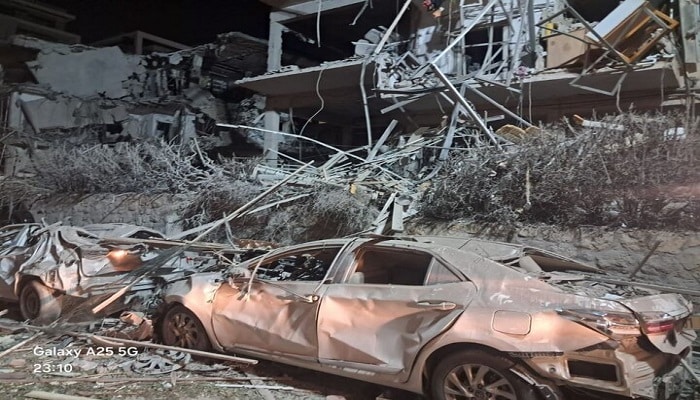PNN – According to international observers, Trump’s haste to reach a ceasefire in the Iran-Israel war is more indicative of a “strategic deadlock between the United States and the Zionist regime” than of his “political psychosis.”
Shortly after Iran’s response to the U.S. operation targeting nuclear facilities in Qom, Isfahan, and Natanz—which included a missile attack on Al Udeid Air Base in Qatar, the largest U.S. military base in the region in terms of personnel and American forces—Donald Trump, the President of the United States, who had previously spoken of the need to dismantle Iran’s nuclear activities or even overthrow its government, immediately changed his tone and began calling for a ceasefire and an end to tensions in the region. In this regard, Trump, whose sudden and successive changes in positions have led to ridicule in international circles, referred to Tel Aviv and Tehran’s desire for a ceasefire and claimed that a ceasefire in this war would be established at 7:00 AM Tel Aviv time [7:30 minutes Tehran time].
In this regard, the Zionist regime, with another miscalculation, thought that by carrying out the most attacks in the final hours before the ceasefire, it could win the war in its name.
Following the attacks in the final hours leading up to the ceasefire, the response of the Islamic Republic’s armed forces in the form of Operation True Promise 3 began two hours before the ceasefire and continued until the last moments in the form of 6 waves of operations, which were accompanied by unprecedented casualties and damage in the occupied territories.
Read more:
Trump: Ceasefire is going very well; Israel suffered a lot of damage
Internal signals of stalemate in the occupied territories
While Netanyahu had forbidden his cabinet from any talk about a ceasefire, the Zionists’ miscalculation complicated matters for them to such an extent that many former senior figures in the Zionist regime and international observers described the end of the war as a very bitter event and a sad tragedy for Netanyahu and Israel.
Avigdor Lieberman, former Israeli minister and head of the Israel Our Home party, said in a statement: A ceasefire without a specific agreement will lead us to another war in the next two or three years, under much worse conditions. Lieberman added that Iran does not want to stop enriching uranium and producing missiles for itself.
The Israeli Channel 12 television also reported that estimates made in Israel indicate that Iran has not yet used its long-range and dangerous weapons; heavy missiles that carry more than a ton of explosives and cruise missiles that are difficult to track and intercept.
“Amit Halevi,” a member of the Israeli parliament, acknowledged that the Iranian regime is still in place. The country still has many missiles and can target us.
Reasons for the US and the Zionist Regime’s Haste for a Ceasefire
The course of the war between Iran and Israel over the past 12 days did not unfold the way the Zionists had planned. Tel Aviv believed that with its initial military operation, it would trigger internal collapse within Iran, and that within a few days, the Islamic Republic would not only fail to contain the external attacks but also lose control over the internal situation, leading it toward collapse. However, the reality turned out to be quite the opposite. Less than 24 hours after receiving the initial blow, Iran launched its own military operations.
The general unity and popular solidarity in the face of the Zionist regime’s brutal attacks on various regions of Iran—and the uninterrupted daily life in Tehran and other cities—was something Zionist analysts failed to accurately assess. Reports from within Iranian society indicated a high level of societal resilience and no disruption in the country’s economic conditions or markets.
On the other hand, Iran’s missile capabilities, as acknowledged by American and Zionist circles, proved to be far beyond what the U.S. and the Zionist regime had anticipated. This came despite the multiple layers of American and Israeli air defense systems, which—contrary to their military propaganda—failed to intercept Iran’s attacks.
Another major concern for the Zionists was the sheer volume and number of Iranian missiles, which indicated that a prolonged conflict would not pose a serious challenge to Iran’s military infrastructure. This stood in stark contrast to American media reports suggesting that the Zionist regime’s air defense systems were suffering from a severe shortage of interceptor missiles.
The miscalculation by the Americans in attacking Iran’s nuclear sites was their belief that Iran would surrender in response to the strike and agree to resume negotiations under the continued aggression of the Zionist regime and halt its uranium enrichment activities. However, this assumption also turned out to be incorrect. This is precisely why, immediately after Iran’s missile attack on the U.S. military base in Qatar, Trump’s tone shifted, and he began calling for an immediate ceasefire in the conflict.
Iran marks the end of the war
The brutal aggression of the Zionist regime, as the Supreme Leader of the Islamic Revolution said, began with a “mistake” by the Zionists, but the end point of this war was drawn by the Iranian armed forces. Currently, any new strategic mistake by the American and Zionist enemy will be met with a serious reaction from the Islamic Republic of Iran, and it is no secret that the continuation of this war is much more terrifying and painful for Netanyahu and Trump than for the Islamic Republic of Iran.

